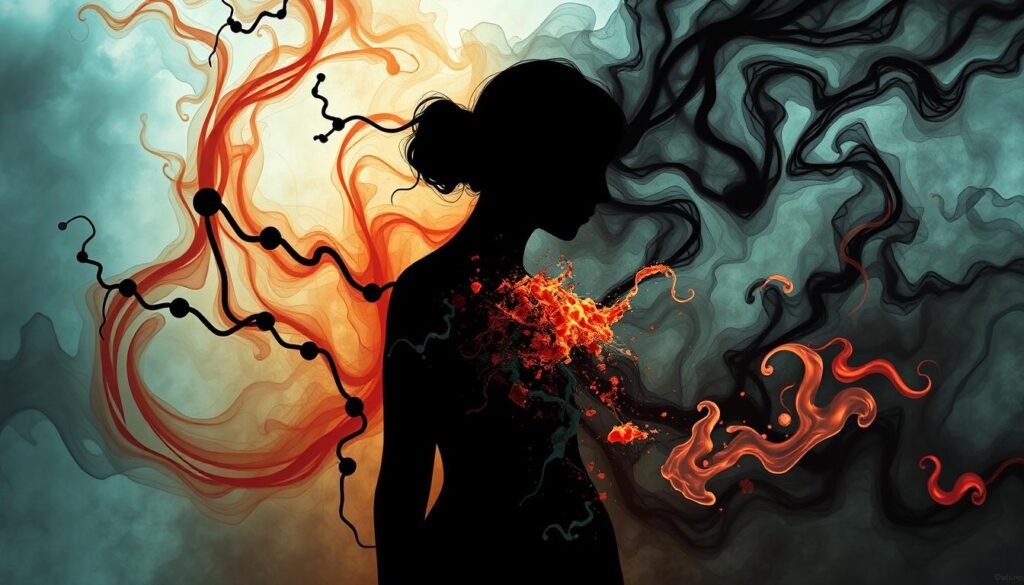Did you know about 80% of people assigned female at birth have symptoms during their menstrual cycle’s luteal phase? These symptoms can be physical, mood-related, or even anxiety. This fact highlights the link between hormonal shifts and anxiety disorders. Considering anxiety affects nearly 31% of American adults, it’s vital to explore if hormone imbalances can cause anxiety.
This guide will look into how hormone imbalances might lead to anxiety attacks. Treating hormone-related anxiety could improve mental health. We will discuss the ways hormonal issues may be behind persistent anxiety symptoms. For more on this important topic, see this comprehensive resource. It explains different hormonal factors that could cause anxiety.
Key Takeaways
- Many individuals assigned female at birth are likely to experience symptoms related to hormonal changes, contributing to anxiety.
- Testosterone’s positive effects can help reduce anxiety and depression across all sexes.
- Autoimmune disorders affecting the thyroid may elevate the risk of anxiety disorders.
- Regular exercise and mindfulness practices can lower stress levels and improve overall mental health.
- Dietary choices, such as consuming omega-3s and fiber-rich foods, can play a role in managing anxiety symptoms.
- Bioidentical hormone replacement therapy offers a potential treatment option for those struggling with hormone-related anxiety.
Understanding Anxiety and Its Symptoms
Anxiety involves a lot of different problems, marked by increased tension and too much worry about possible dangers. It’s important to spot symptoms of anxiety early to deal with them effectively. The most common signs include feeling uneasy, scared, and worried, all of which badly affect daily activities.
Anxiety isn’t just about feelings. It often shows through physical symptoms too. These can include breathing fast, heart beating hard, getting headaches, and feeling your muscles tense up. These signs might change or get worse because of things around us or changes in our body chemistry.
Studies show that hormones can play a big part in how anxious we feel. For example, those assigned female at birth often deal with anxiety linked to their menstrual cycle. During the luteal phase, up to 80% might feel at least one symptom of anxiety.
The link between anxiety and hormone shifts underline how complex this issue is. Serotonin and testosterone, for instance, are crucial for managing our moods. Research has found that both low testosterone in those AFAB and thyroid issues can make anxiety worse, also increasing physical symptoms related to these conditions.
It’s key to notice both the mental and physical signs of anxiety to diagnose disorders like Generalized Anxiety Disorder (GAD) and Panic Disorder (PD). It also helps to watch your lifestyle habits, like how well you sleep and handle stress, to manage anxiety well.
| Category | Common Symptoms |
|---|---|
| Emotional Symptoms of Anxiety |
|
| Physical Symptoms of Anxiety |
|
What is Hormonal Imbalance?
Hormonal imbalance happens when there’s too much or too little of a hormone in the body. It can lead to various conditions that harm our health. Knowing what causes hormonal imbalance is important. It can be due to many things like tumors, autoimmune diseases, or environmental toxins. Each hormone in our body has its job but they all work together too.

Many might not know how hormonal changes can affect mental health. For example, hypothyroidism can make someone feel depressed. And problems with the adrenal gland might make a person feel anxious or on edge. Hormonal ups and downs can cause mood swings, changes in weight, and trouble sleeping.
- Hormones like estrogen and progesterone impact our moods. When they’re off, we might feel different.
- Cortisol, a stress hormone, affects how we feel emotionally. It’s crucial for our overall mood.
- Thyroid hormones help control our mood and energy. If they’re not balanced, it can lead to mood issues.
If you’re having symptoms of hormonal imbalance, it’s key to get help. Not getting treatment can make things worse, affecting your mental health deeply. Learning about hormone-related conditions and what causes them helps find good treatments. For more details, you can get advice from the experts at SynergenX.
| Hormone | Symptoms of Imbalance |
|---|---|
| Estrogen | Mood swings, irritability, depression, weight gain |
| Progesterone | Anxiety, fatigue, irregular cycles, sleep issues |
| Cortisol | Increased stress, weight gain, fatigue, sleep disturbances |
| Thyroid Hormones | Weight fluctuations, depression, anxiety, temperature intolerance |
Can Hormone Imbalance Cause Anxiety?
Hormonal imbalances can lead to various physical and emotional symptoms. There is a strong connection between these imbalances and anxiety disorders. Studies show certain hormones affect anxiety levels.
Changes in hormones can cause anxiety. This is especially true during significant life stages. These stages are unique to those assigned female at birth.
Link Between Hormones and Anxiety Disorders
Many individuals experience anxiety with hormonal changes. About 80% of those assigned female report symptoms during their menstrual cycles. These can be physical, mood-related, or anxiety-related.
Anxiety is more common in people AFAB, likely because of lower testosterone. Testosterone can positively impact anxiety and depression. Also, 71 out of 76 patients with anxiety had increased blood flow to their thyroid. This links thyroid issues to higher anxiety levels.
Common Hormones Involved in Anxiety
Cortisol and adrenaline are stress hormones linked to anxiety. Lowering these hormones through regular exercise can reduce anxiety. Stress management, like yoga and meditation, also helps.
Nutrition is important too. Foods high in fiber, fermented items, and omega-3s can relieve stress. Poor sleep often ties back to hormone imbalances. Good sleep habits are crucial. It’s important to seek help for hormone-related anxiety. For more on how hormones affect anxiety, visit this link.

Hormone Imbalance Anxiety Symptoms
Many people feel various symptoms because of hormone imbalances. These can be both emotional and physical. Knowing these symptoms helps us understand how emotions and hormones are linked. The effects of hormone imbalance are clear, impacting daily life and well-being majorly.
Emotional Symptoms of Hormone-Related Anxiety
Here are the emotional symptoms often seen:
- Nervousness and irritability
- A sense of impending doom
- Increased mood swings and emotional instability
- Heightened feelings of sadness or depression
These symptoms often come from changes in estrogen and testosterone. They’re especially common in individuals assigned female at birth. Life stages like menstruation and menopause can trigger them.
Physical Symptoms Related to Hormonal Changes
Physical symptoms due to hormonal changes are wide-ranging. Some common ones include:
- Hyperventilation or rapid heartbeat
- Sleep disturbances or insomnia
- Unexplained weight gain or loss
- Digestive issues such as constipation or diarrhea
- Fatigue and lack of energy
Conditions like hypothyroidism can cause these physical symptoms. They deeply affect mental health. Stress leading to high cortisol levels makes anxiety worse, changing stress into ongoing anxiety. It’s key to know that hormone imbalance symptoms affect both how we feel and our bodies.
Hormonal Fluctuations and Anxiety Connection
Hormonal changes are a big cause of anxiety. Life events like puberty and menopause can change anxiety levels. Knowing about this can help people deal with symptoms and get better mentally.
How Life Stages Affect Anxiety Levels
Those born female might feel more anxious during special life moments due to hormone shifts. For example, many report feeling different emotionally before their period. Things like premenstrual syndrome and after-baby blues show how these changes can make anxiety worse. When estrogen drops during menopause, anxiety and mood problems can increase. This shows the strong link between hormone stages and how we feel.
Key Hormonal Changes That Impact Mood
Certain hormones play a big role in our mood and anxiety levels. Changes in serotonin can lead to anxiety disorders. Cortisol helps us handle stress but can make us feel more anxious if it’s out of balance. Thyroid problems can cause feelings of sadness and worry too. Understanding these hormones can lead to better treatment options. This includes hormone therapy, stress relief activities, and eating right to help balance hormones.

| Life Stage | Hormonal Changes | Impact on Anxiety |
|---|---|---|
| Puberty | Increase in estrogen and testosterone | Heightened emotional responses, increased anxiety |
| Menstruation | Estrogen and progesterone fluctuations | Exacerbation of PMS and anxiety symptoms |
| Pregnancy | Rapid hormonal changes | Increased anxiety risk, especially postpartum |
| Menopause | Decrease in estrogen | Severe mood swings, heightened anxiety levels |
Managing Anxiety from Hormone Imbalance
Managing anxiety from hormone imbalances needs careful attention. Using functional medicine can really target what causes the anxiety. Such methods not only look at symptoms but improve overall health with unique care plans. These might have nutrition, supplements, and hormone tests.
Functional Medicine Approaches
Functional medicine looks closely at what makes each person unique. This method may check hormonal levels, neurotransmitter balance, and how lifestyle affects us. Practitioners might suggest:
- Comprehensive hormone testing to find imbalances.
- Using special supplements like omega-3 fatty acids to help mood.
- A diet full of whole foods to help hormone health.
- Using therapies like acupuncture or chiropractic care.
This way, by dealing with the root problems, treatments really fit what each person needs.
Lifestyle Changes to Alleviate Symptoms
Making lifestyle changes is key to easing anxiety symptoms. Regular exercise, like yoga or running, can make a big difference in hormone balance. Techniques for managing stress, like meditation and breathing exercises, also help lower anxiety levels. Plus:
- Eating well supports your brain and keeps moods stable.
- Getting enough sleep and having a routine helps recovery.
- Cutting down on caffeine and alcohol can stop symptoms from getting worse.
- Being social and keeping up with friends increases oxytocin, which helps us handle emotions better.
These changes, along with functional medicine, create a strong support system for dealing with anxiety.
For more details on how hormones affect anxiety, check out understanding triggers.
Treating Hormone-Related Anxiety
To treat hormone-related anxiety well, we use a combo of medical and alternative methods. It’s key to know one’s individual needs. This way, you can pick treatments that handle anxiety and hormonal issues at once.
Medical Treatment Options
Medical treatments are vital for this kind of anxiety. For some, hormone therapy makes a big difference, especially if their anxiety comes with their menstrual cycle. Plus, medications might fix hormonal imbalances and ease anxiety.
- Hormone Replacement Therapy (HRT)
- Selective Serotonin Reuptake Inhibitors (SSRIs)
- Thyroid medications for hormone optimization
- Corticosteroids for adrenal hormone balance
Alternative Therapies for Hormonal Balance
Adding alternative therapies can also help. These often involve changing your lifestyle or trying holistic methods.
- Mind-body practices: Yoga and meditation boost relaxation and help with stress.
- Dietary adjustments: Eating foods rich in fiber, omega-3s, and fermented stuff aids hormone and mental health.
- Herbal supplements: Plants like ashwagandha and St. John’s Wort might stabilize your mood and lower anxiety.
- Regular exercise: Moving your body can change hormone levels and reduce anxiety.
Handling hormone-related anxiety well means looking at both hormones and mental health. Working alongside healthcare folks can perfect treatment for you. This improves life quality and lowers anxiety signs.
| Treatment Type | Description | Benefits |
|---|---|---|
| Hormone Replacement Therapy | Replenishes deficient hormones | Can alleviate symptoms related to hormonal fluctuations |
| Prescription Medications | Medications like SSRIs for anxiety | Effective in managing anxiety symptoms |
| Nutrition Therapy | Diet emphasizing fiber and omega-3s | Supports hormonal health and mental well-being |
| Mind-Body Practices | Yoga and meditation sessions | Enhances relaxation and stress management |
| Regular Exercise | Physical activity routine | Improves hormone levels and mood |
Understanding the Role of Stress Hormones
Stress hormones like cortisol and adrenaline help manage how we react to stress. But, when these hormones stay high because of ongoing stress, they can mess with our hormonal balance. This leads to health problems like more anxiety, mood swings, and even physical issues. Knowing how stress messes with hormonal balance is key to good health and mental wellness.
How Stress Affects Hormonal Balance
Being stressed for a long time keeps cortisol and adrenaline levels high. This can upset the balance of hormones like estrogen, progesterone, and testosterone. Symptoms might include irregular periods, gaining weight, and feeling emotionally out of control. Almost half of people who can have children and are of childbearing age deal with stress-related hormonal issues. It shows how important it is to spot high stress hormones early and handle them right away.
Identifying Elevated Stress Hormones
It’s crucial to recognize when stress hormones are too high. Signs include feeling tired, having mood swings, stomach problems, and trouble sleeping. Also, many people don’t know that their anxiety and other symptoms come from their hormones changing. It’s key to see a doctor to check on your hormones and look at your treatment options. Things like regular exercise and relaxing can lower stress hormones. This leads to better hormonal health. For more tips on dealing with stress and its effects on hormones, check out this informative resource.